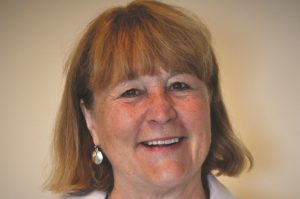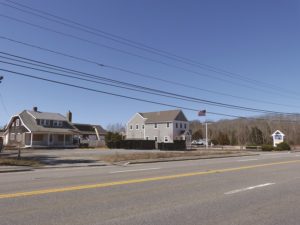PROVINCETOWN — After three years on the finance committee and three years on the select board, Louise Venden is running for a second term. Venden owned a nine-room guest house in Boston before moving to Provincetown full-time, and she worked in real estate financing as well. She describes herself as focused on housing issues, municipal finance, and long-term planning.
“I think I’ve gained the confidence of other board members in my observations about financial matters,” said Venden. “We need to make sure the budget and other policies we pass conform to a larger vision of where the town is going, what the needs are.”
Venden cited the town-owned market-rate housing at Harbor Hill as an example of this focus. She joined the board of the Year-Round Market-Rate Rental Housing Trust last year because she was concerned about the project’s long-term financing. Making sure Harbor Hill is sustainable is a prerequisite for other housing efforts, said Venden.
“We have very dramatic housing needs that are not going to be met by the marketplace here,” she explained. “I am concerned with where we are going on housing in the next three years, and making sure we have the resources to expand housing. Maushope is looking at an expansion — that’s low-income senior housing. We need to move forward with affordable housing at the V.F.W. As a community, we owe it to ourselves to make Harbor Hill work.
“But we need to make sure this project is healthy, that the numbers are reliable, and that townspeople have confidence in the way we’re going about this,” she added. Venden pushed for a capital needs assessment for the property, to make sure future costs were better understood. She is also interested in finding out if there can be an infusion of private capital while maintaining the existing rental rules.

A chain of other expenses also concern Venden, including the ill-fated police station plan. “We need to reform a committee of architects, engineers, Chief Golden, and people who have recently built police stations on the Cape, and see what we can come up with,” she said. “I thought the location was a good one,” she said of the site between Jerome Smith Road and Route 6. “The cost was not out of line, if you look at other stations that have been built on the Cape,” she argued. That proposal was sidetracked by a discussion of the V.F.W. site, she said. “I was really disappointed by that — it obscured the issue.”
Venden wants to see a new police station proposed soon, because a new DPW facility is in line behind it.
“Truro has a $20 million proposal for a DPW garage, and we have a $14 million DPW proposal,” she said. “I realize it flies in the face of some longstanding traditions, but I would like to see us collaborate on some of these things. I would hope that we could figure out a way to make that work.”
Long-term planning is Venden’s recurring theme. “We need to make sure we focus the staff on not just this year or next year. We need to think about where to spend our money for the future of this town. We need to support a more diverse and resilient economy. A larger vision of where the town is going — that’s the select board’s role.”





